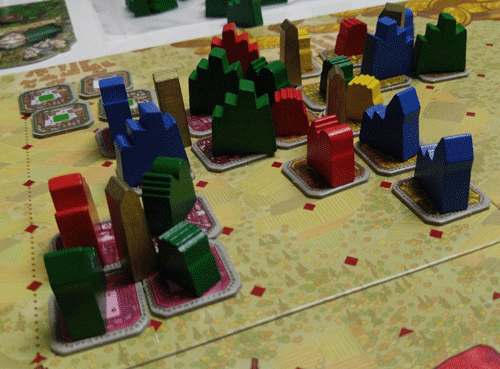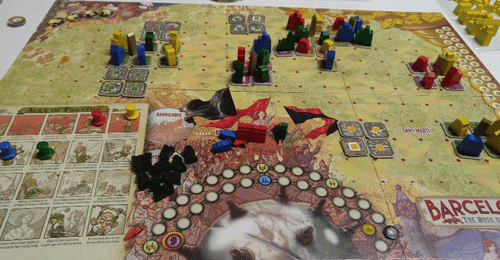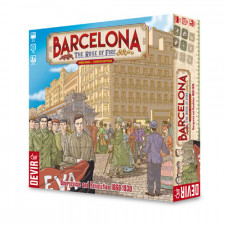Barcelona: The Rose of Fire Review
on Mar 15, 2017
One of the biggest traps that many modern Euros fall into is that they have a lot of things going on without any real purpose or cohesiveness. Often, these games feel like they have complexity for the sake of complexity. To quote the philosophical masterpiece Jurassic Park: “they were so preoccupied with whether or not they could; they didn’t stop to think if they should.†So, despite its theme that having a ton of historical flavor, Barcelona falls short of being as exciting as its premise holds.
In Barcelona, you take on the role of wealthy families who are using their wealth to turn the medieval-designed city of Barcelona into a modern metropolitan. Tear down those walls, Señor! Each turn, you use cards to lay tiles on the board and construct one of four types of buildings (upper class, middle class, working class, and low cost). Over the course of the game, the city of Barcelona will rise and city blocks begin to sprawl across the grid. You acquire points based on the type of buildings that you’ve constructed. Winning majorities in districts gains you better cards for use in the next round. Simple, right? Well, the game would be had the design ended there. Instead, there are additional mechanisms layered on that start to bog the game down.

Admittedly, the buildings are pretty cool looking.
When constructing a building, you must “pay†striking workers. At the end of a round, all of these workers get put into a bag and drawn. When yours get pulled out, these guys drag you down on the prestige track – a separate track than the victory point track. This prestige track matters because whoever is highest will break ties, which happens often when comparing who has more workers to take the labor union “lose an action†card or for scoring district majorities. It will also gain you a special prestige card that lets you do your normal tile-laying-building-construction action but with an added benefit. Sounds important, right? It is, except it’s very hard to really maneuver your positioning on the prestige track. So, it ends up being that whoever is highest gets the bonus card, yet you can’t really control your position on the track aside from just putting out buildings that will require fewer workers, which also means buildings that get you fewer victory points.

So much flavor text, you could lick it.
On top of this prestige track, there are also influence counters that can be exchanged for influence cards. These fancy nobles gain you victory points at the end of the game. Or, you can use influence counters for small bonuses during the game. You can only acquire the counters by playing an upper class building though, which costs more striking workers.
What all of these parts add up to is a balancing act that isn’t very fun or fulfilling. Figuring out how to get points can be a bit opaque, especially when the game has several unknowns. There is randomness in what cards you get, the pull of workers from the bag, and the pull of influence counters (from a second bag). Though none of these things bother me in games in and of themselves, the combination makes you feel like you could have strategized as to where to place a tile or which building to construct, but end up in the gutters of the prestige track simply due to a few bad pulls. Oddly, there is a sense of the rich-getting-richer (ironic, given the theme) through several of the scoring mechanisms, even though this hasn’t seemed to actually be a problem in the endgame scores. The game largely demonstrates that it is balanced; it just doesn’t feel that way when you play it.

Tracks on tracks on tracks.
To its credit, Barcelona does have some clever thematic integration in the game. For example, building a “low cost†building has higher status, meaning you don’t pay as many striking workers as the “upper class†building. It turns out that the common man much prefers to build affordable housing than Trump Tower. There is also the possibility of anarchy occurring in the game if the marker on the social conflict track makes its way to the end. If this happens, the building points are reversed: upper class buildings typically award you for 4 VP, but now they are only 1 VP. The people have revolted and are not particularly enthused about all those McMansions. However, this demonstrates, again, the game’s biggest flaw: extra stuff thrown in, needlessly complicating the game without the payoff of more enjoyment or interesting decisions.
Barcelona is filled with side rules and fiddly scoring, which makes it not only an absolute chore to teach (and learn), but also an onerous task while playing as you have to make sure you didn’t miss as step in the round. (And, unfortunately, no player aid is provided, so you have to keep fumbling through the rulebook to double check.) This doesn’t mean the game is difficult to play. In many ways, it’s very simple: everyone’s turn is just choosing a card and constructing a building. However, there are so many nuts and bolts tacked on that the game feels like they were creating more mechanisms in order to fix something that was broken instead of just reworking it from the start. It’s also hard to feel like the actions you did earlier in the game really affected your outcomes later on. In the end, there’s nothing bad about this game. It is firmly okay while also being firmly ignorable. There aren’t any exciting moments that grab you by the face and pull you into the game. As one of my game group members said, perfectly encapsulating the overall experience, “it didn’t light me upâ€.

 Customer Support
Customer Support  Subscribe
Subscribe 




 Account
Account  Wishlist
Wishlist 

